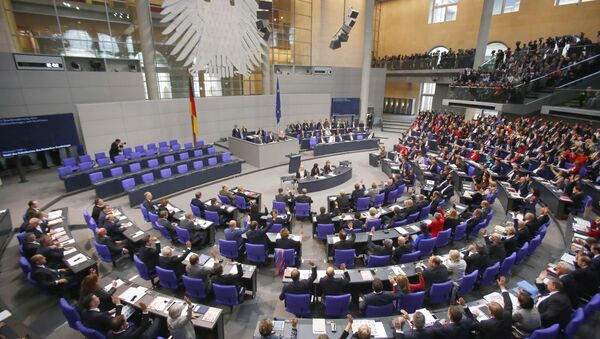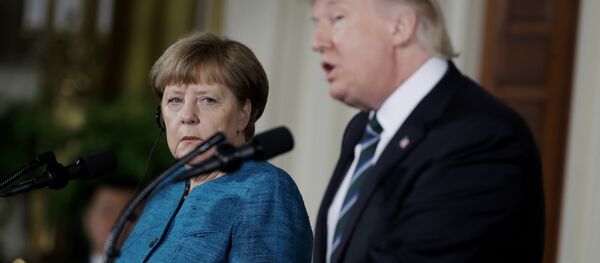Brian Becker and Walter Smolarek of Sputnik Radio's Loud & Clear spoke to Mark Sleboda, a Russia-based international relations and security analyst who is a frequent critic of the Western international order, such as globalism and neoliberalism.
"Three of the scenarios are actually positive — perhaps too positive, some critics have suggested," Sleboda remarked. "They describe domestic bliss and a bored military with nothing to do."
"Three of the other scenarios are negative — the one that has drawn the most attention is titled ‘The EU in disintegration and Germany in reactive mode.' This describes where the Western-led international order has begun to fall apart and the member states have left the EU. Advancement has stopped and there's disunion within the EU itself."
Sleboda continued. "Another of the scenarios envisions multi-polar competition within the EU itself. This envisions that several states within the EU convert to what is described as the ‘Russian state capitalist model'… I could only imagine that is in comparison to the pro-globalization neoliberal driven model that the EU has now."
Becker asked Sleboda to explain a few of the terms he was using to the audience, such as state capitalism. Sleboda replied that while there lacked a consensus on many of the terms used in the German document, "state capitalism" refers to a model "similar to the Russian economic model right now, where a large portion of natural resources, public utilities and the strategic sectors like defense are run by state companies. The rest of the economy, who makes the soap and so on, is all run by private industry."
"How this exactly differs from the EU, in which a large number of their countries also have state energy companies and have a [state-run] defense industry, I'm not exactly sure. But certainly, the EU goes out of its way to expand free trade agreements in a way that perhaps Russia isn't quite so willing to follow."
Sleboda added that he could definitely envision scenarios where the EU, which has been embroiled in economic and sociopolitical crises for about a decade, could crumble or disintegrate. "I think we have to consider that there are multiple factors that are affecting the unity of the EU. The third scenario that we didn't talk about was ‘West to the East,' where several new central and eastern European members form their own Eastern Bloc, perhaps with Russia or perhaps on their own."
"There's definitely Western-Eastern and Northern-Southern discord within the EU: Northern-Southern discord is largely economic, and the Western-Eastern discord is largely over social issues. [Eastern Europe is] adopting more conservative populist politics, while the West is pushing an extreme postmodern liberal and neo-liberal model quite forcefully on the East. [This] is leading to problems between the European Commission and the governments in Poland and Hungary and Slovakia."
"Some of the hot issues that are really driving this dissent in Eastern Europe are LGBT rights and gay marriage — but also migration is a major issue, and there's multiple ways they used to push this." Sleboda provided an example: the European Court of Human Rights, which is affiliated with the Council of Europe — a supranational organization independent from the EU and includes non-EU nations like Norway, Russia, Turkey and Ukraine among its members.
"The Council of Europe has 47 members," said Sleboda. "Thirty-six of the members are not willing to enact judgments by the European Court of Human Rights, to the tune of 9,944 judgments that are not being carried out by a vast majority of the countries in Europe. That is, many argue, because the European Court of Human Rights is being used politically to push a political and ideological agenda on countries which are not willing to obey it."
Becker mentions that once upon a time, in the 18th and 19th centuries, Germany (and its predecessor state Prussia) were more closely aligned with Russia than they were with Western Europe and the US. He asked if there was any possibility of such a reorientation, with Germany distancing itself from the Western bloc in favor of Moscow.
Sleboda was skeptical. "The German establishment right now is very largely anti-Russian. Even the traditional Socialist Party of Germany had been moving further away from these positions in recent years. While we have seen former German prime ministers and chancellors like Gerhard Schröder and others try to push Germany further into a good relation[ship] with Russia, they haven't met much success."
"In fact, overall it has been in the opposite direction. This has led to some discontent, especially with the sanctions regimen, by a large number of German businesses who were really looking at growth in Russia as improving their economic situation. They've been largely cut off from that, and they see other countries like China quickly moving in to take their place and perhaps permanently locking them out of that market, even if sanctions are one day removed.
"But this is mostly on the business level. We haven't really seen it reflected in politics, which is going the other direction. So I think they're probably right not to consider that as a probable scenario in their future."







